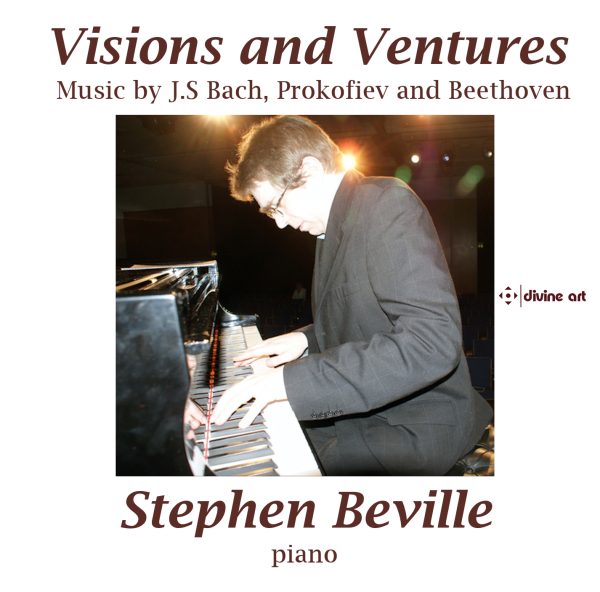Infodad
Stephen Beville’s new Divine Art disc features works by composers whose music is rarely heard on the same program. The longest piece here is the 22-brief-movement Visions Fugitives by Prokofiev. These are micro-miniatures (half the movements last less than 60 seconds) that explore various keys, rhythms and tempos with greater delicacy than one usually associates with this composer. Movements such as the fourth, Animato, are a bit closer to the dry and wry wit of Prokofiev than are most of these little pieces, many of which have a pleasantly relaxed air about them: Pittoresco, Commodo, Allegretto tranquillo, Poetico and others. At the other extreme is the genuinely amusing Ridicolosamente, which has a purity of fun not usually heard in Prokofiev – the Feroce and Inquieto movements are less surprising. The final two movements, which Beville contrasts especially effectively, sum up the many moods of this suite very well: the penultimate Presto agitatissimo e molto accentuato is followed by the longest movement of all, Lento irrealmente.
The tempo designations themselves show just how much Prokofiev wanted to communicate through these not-quite-trifles in terms of their mood swings. That makes the contrast between this piece and the Beethoven sonata that Beville offers all the clearer. This fourth Beethoven piano sonata, Op. 7, is quite an early work (1796) but was seen by the young composer as a grand one – in fact, Beethoven designated it Grande Sonate, and at 29 minutes it is one of the longest the composer ever wrote. One reason Beethoven labeled it as he did was that the sonata was published by itself, not as part of a set – an unusual occurrence at the time. But the significant growth in expressiveness after his first three sonatas may have had something to do with the designation as well. The first two movements are big, almost imposing, and filled with plentiful themes and virtuosity (first movement) and with poetry and drama (second). The third and fourth movements are simpler and more earthbound. The sonata as a whole is an impressive achievement, and the first such work in which Beethoven began to explore new expressive forms.
The contrast with the miniaturization in Prokofiev’s Visions Fugitives is very pronounced indeed. Beville sets up the Prokofiev/Beethoven exploration by first offering Bach’s Prelude and Fugue in E, BWV 878, which he presents with straightforward simplicity, if perhaps rather too much reliance for emotional impact on the piano’s pedals (especially in the fugue). The Bach sits somewhat uneasily at the start of this CD, leaving it unclear where Beville is going with the whole thing – although by the disc’s end, his interest in contrast both within the Prokofiev and Beethoven and between them is clear enough.
@divineartrecordingsgroup
A First Inversion Company
Registered Office:
176-178 Pontefract Road, Cudworth, Barnsley S72 8BE
+44 1226 596703
Fort Worth, TX 76110
+1.682.233.4978












